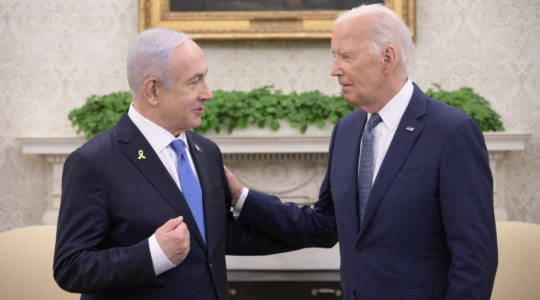JERUSALEM (JTA) – With the Labor leadership primary less than two weeks away, it’s becoming increasingly clear that the party’s next leader will decide the future of Ehud Olmert’s government. Four of the five candidates are threatening to pull Labor out of the coalition with Olmert’s Kadima Party in a move that almost certainly would bring down the government and spark early elections. Only current Labor Party leader Amir Peretz, 55, is prepared to go on serving unconditionally in an Olmert-led government. But polls show that Peretz’s chances of re-election are not high. Both front-runners – Ami Ayalon, 61, the former Shin Bet security services chief, and former Prime Minister Ehud Barak, 65 – say they will take Labor out of the coalition unless Olmert steps down or sets a date for early elections.With Ayalon and Barak running neck and neck, the race is heating up. The stakes are high: Given the nation’s current leadership vacuum, either man could quickly become a serious candidate for prime minister once he is installed as Labor chief.It was the youngest candidate, Ophir Pines-Paz, 45, who focused the race around the issue of leaving the coalition. For months he has been arguing that Labor cannot remain in an Olmert-led government and retain credibility as a more caring and less corrupt governing alternative. In the wake of the Winograd Commission’s scathing report on Olmert’s conduct of last summer’s Lebanon war, Pines-Paz held a 48-hour sit-down strike outside the prime minister’s official Jerusalem residence demanding that he resign. Labor, Pines-Paz said, could not possibly go on serving in a government headed by such a tarnished leader. Former Mossad chief Dani Yatom, 62, whom polls show in last place, took a similar position. Ayalon, who initially favored staying in an Olmert-led government, changed his mind and now says he will lead Labor into the opposition. The experienced Barak adopted a more nuanced stance. In a makeshift press conference at Kibbutz Sdot Yam last week he demanded that Olmert resign – but in the same breath Barak said he would be prepared to serve as defense minister in an Olmert-led government for a short, transitional period until new elections. Peretz, who also was tainted by the war, says Labor has no right to demand changes at the top in a rival party like Kadima, adding that he has no problem continuing to serve under Olmert. If he wins, Peretz says he will resign as defense minister and demand the Finance Ministry instead, regardless of whether Olmert stays on as prime minister.Labor’s Central Committee was scheduled to meet May 18 in Tel Aviv to vote on the future of its alliance with Kadima. Motions are expected to spell out the conditions under which Labor might agree to stay in the government. Pundits say the minimum demand is likely to be that Olmert resign.But Labor’s would-be leaders face a dilemma. Do they really push for early elections – polls say that would bring the Likud’s Benjamin Netanyahu to power – or do they use a stint in a Kadima-led government to build stronger national leadership credentials? Both Ayalon and Barak have their sights set on the Defense Ministry that Peretz intends to vacate. Their pre-Winograd strategy was to use it as a steppingstone to the premiership, with elections in late 2007 or early 2008. Barak is keeping that option open even if Olmert stays on by saying he would serve alongside Olmert if he agrees to set a date for early elections.Netanyahu, who wants early elections, has been sending Labor leaders reassuring messages that they have nothing to fear from a Likud-led administration. He promises to set up a national unity government with Labor rather than a coalition with the far right. But the Laborites are skeptical. They don’t trust Netanyahu, who in the past preferred narrow, right-wing governments. Describing Netanyahu’s overtures to Labor, Ha’aretz political analyst Yossi Verter wrote, “This is like a mouse-eating cat trying to persuade the mouse to come out of his hole and play by saying he is no longer that kind of cat.”Meanwhile, the race between Ayalon and Barak is heating up. In what Israeli newspapers dubbed “the war of the generals,” Amiram Levine, a former head of the Israel Defense Forces’ Northern Command, tore into Barak, describing him as a man with psychological problems, questioning his integrity and accusing him of “throwing people who help him to the dogs” when he no longer needs them. Labor’s choice, Levine wrote, was between “leadership that was rotten and corrupt” (Barak) or “straight, genuine and serious” (Ayalon). The Barak camp accused Ayalon of getting Levine to write what he did.With five candidates, one would need 40 percent of the vote to win outright in the first round. A runoff is likely in mid-June, probably between Ayalon and Barak.Ayalon, who commanded the Navy from 1992 to 1996, headed and rebuilt the Shin Bet after its failure to prevent the assassination of Yitzhak Rabin in 1995. He has a master’s degree in business from Harvard and a reputation for integrity and straight talk.In 2003, Ayalon launched the “Peoples’ Voice” with Palestinian academic Sari Nusseibeh, persuading hundreds of thousands of Israelis and Palestinians to sign onto a six-point peace deal. Ayalon’s Achilles heel, though, is his lack of political experience: He has never held a ministerial post.Barak’s great advantage is his experience as IDF chief of staff, prime minister, defense minister, foreign minister and interior minister. His weakness is his failure as prime minister from 1999 to 2001, when peace talks with both Syria and the Palestinians proved fruitless, the intifada began and Barak was forced to go for an early election that he lost in a landslide to Ariel Sharon.But both men have a political gravitas that could pave the way for a serious bid for the premiership. For the first time in years, Labor could be about to get a credible challenger for national leadership. Given Olmert’s political troubles, the question of whether Labor actually has picked a winner could be put to the test fairly soon.

Help ensure Jewish news remains accessible to all. Your donation to the Jewish Telegraphic Agency powers the trusted journalism that has connected Jewish communities worldwide for more than 100 years. With your help, JTA can continue to deliver vital news and insights. Donate today.





